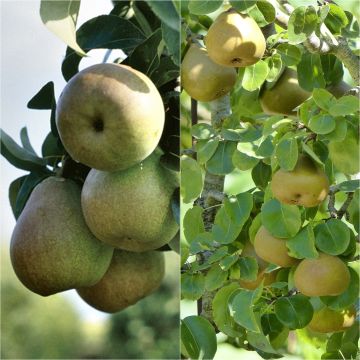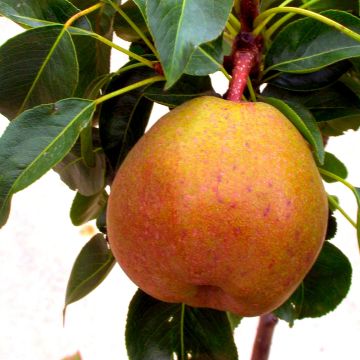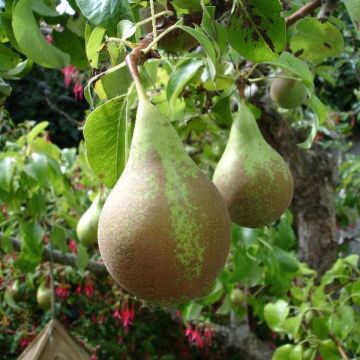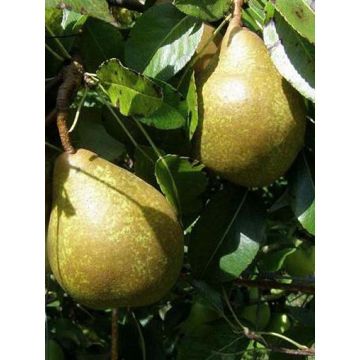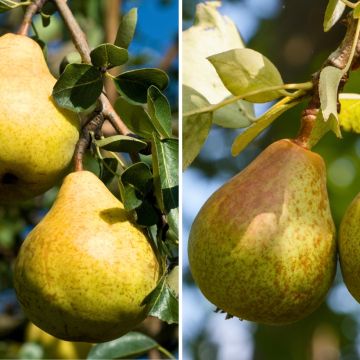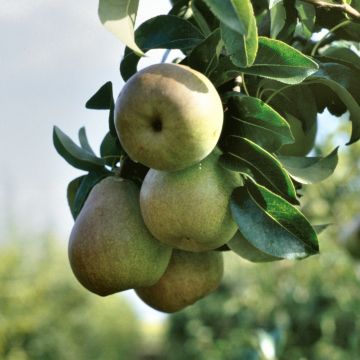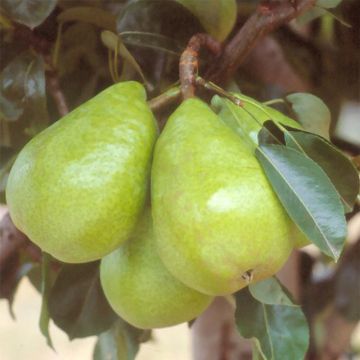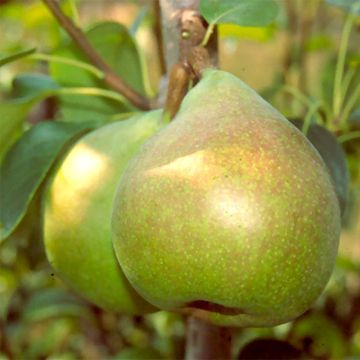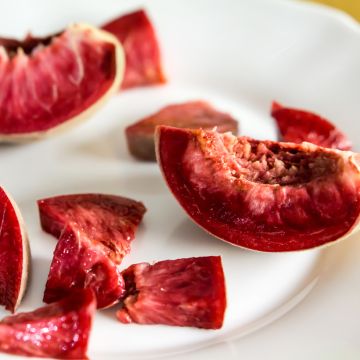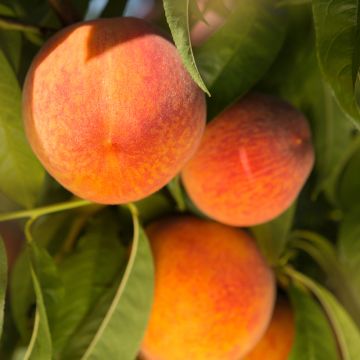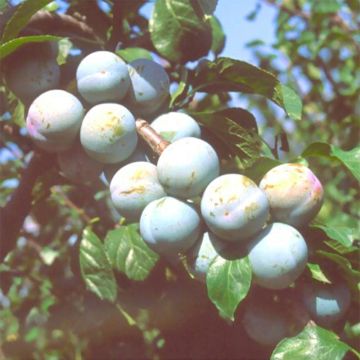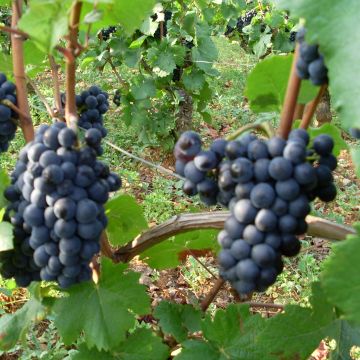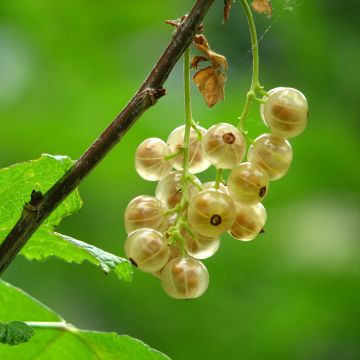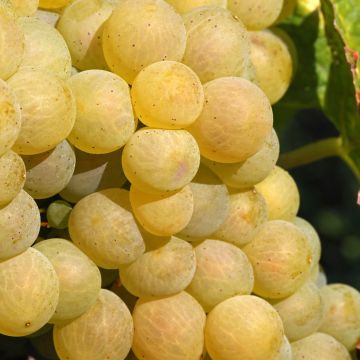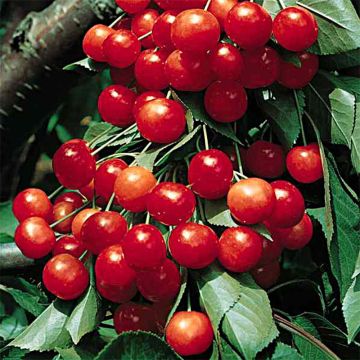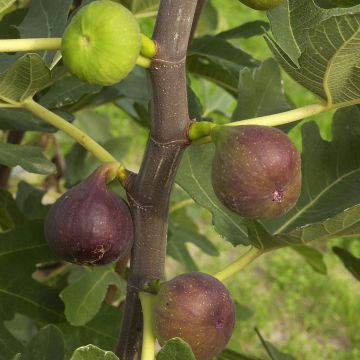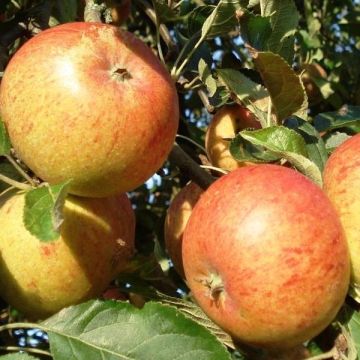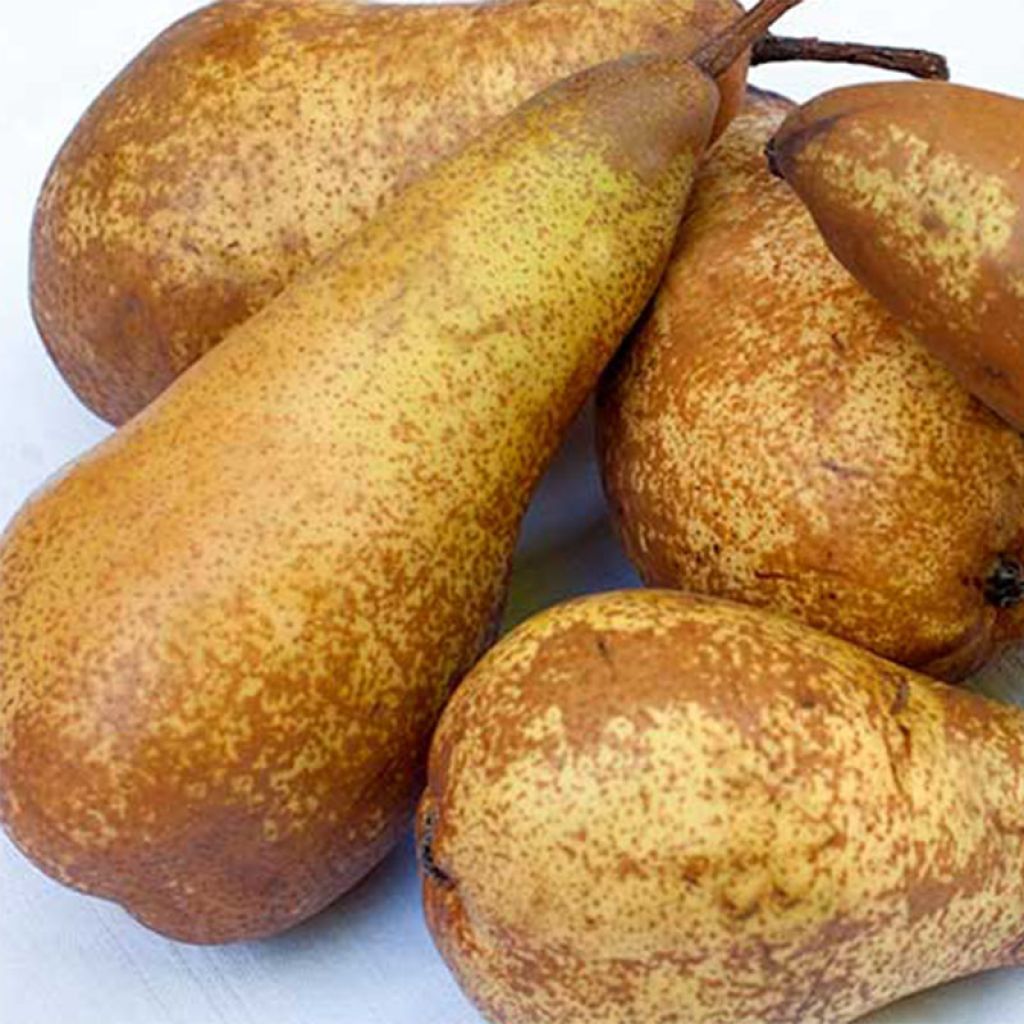

Poirier Abate Fetel
Pyrus communis Abate Fetel - Pear Tree
Pyrus communis Abate Fetel
Common Pear, European Pear
Très bon emballage et surtout très bel arbre
BERNARD C., 08/12/2018
This item cannot be shipped to the selected country
Oversize package delivery charge from €6.90
Delivery to Corse prohibited
More information
Schedule delivery date,
and select date in basket
This plant carries a 6 months recovery warranty
More information
We guarantee the quality of our plants for a full growing cycle, and will replace at our expense any plant that fails to recover under normal climatic and planting conditions.
Oversize package: home delivery by special carrier from €6.90 per order..
Express home delivery from €8.90.
Delivery to Corse prohibited: UE law prohibits the import of this plant from mainland France to Corse as part of the fight against Xylella fastidiosa. Please accept our sincere apologies.
More information

Description
The 'Abate Fetel' Pear Tree is a hardy tree of medium vigour, making it well-suited for the garden. It has a good yield. It produces large elongated pears, 8 cm (3in) in diameter, with yellow skin that turns bronzed and speckled with brown when ripe. Highly appreciated in Italy, their white flesh is juicy and melting, with a sweet and mild flavour, and very aromatic. Harvest takes place from mid-September, depending on the region. The Abate Fetel Pear Tree is not self-fertile.
The pear tree is native to central Asia, cultivated in China for 6,000 years. It was introduced to Europe around the 6th century. The 'Abate Fetel' Pear Tree was discovered in France by Abbot Fetel in Chessy-les-Mines. In 1866, he planted seeds, among which were the varieties Duchesse d'Angoulème, Beurré d'Hardenpont, Beurré Clairgeau, Alexandrine Douillard,... The first fruiting of the Abate Fetel Pear Tree occurred in 1870.
Although not frost-sensitive, the 'Abate Fetel' Pear Tree still appreciates sheltered and sunny locations, avoiding frosty and windy situations. It is easy to grow and likes fresh and deep soils but dislikes excessively draining and calcareous soils. Add a scoop of wood ash rich in potash in winter to improve flowering and fruit quality.
Its upright habit gives it a tall and slender silhouette. Its oval-shaped leaves, finely dentate at the edges, have a petiole as long as the lamina and measure approximately 8 to 9 cm (3 to 4in).
Its late white flowering occurs in late April, protecting it from frost. Five white petals form its flowers. They are not self-fertile. It is, therefore, necessary to plant another pear tree nearby. The most commonly used pollinator is the variety, Beurré Hardy.
This variety is extensively cultivated in Italy. It produces large elongated pears, 8 cm (3in) in diameter, with yellow skin that turns bronzed and speckled with brown when ripe. Their white flesh is juicy, melting, with a sweet and mild flavour, and very aromatic.
Pears can be consumed fresh, in syrup, in pastries, in jams and compotes, and can be used to make alcoholic beverages...
For transportation reasons, our tallest trees may be pruned before shipment. They are suitable for all common training sizes: cordons, espaliers, goblets, half-standards, and low standards, except for high standards. If you would like more information or advice on training your fruit trees, please do not hesitate to contact us.
Report an error about the product description
Pyrus communis Abate Fetel - Pear Tree in pictures
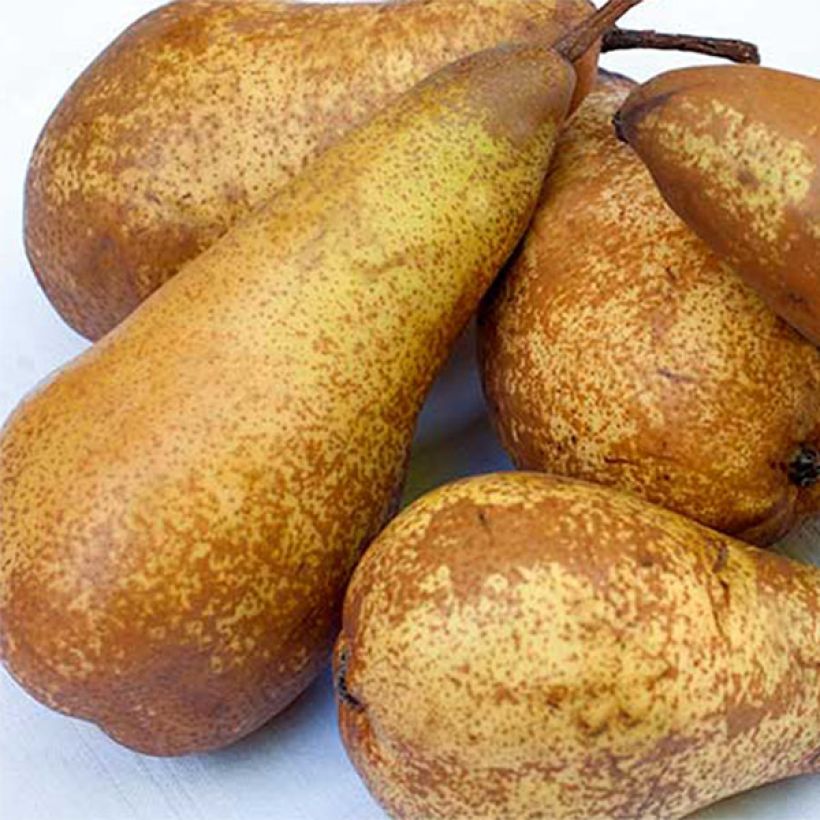

Plant habit
Fruit
Flowering
Foliage
Botanical data
Pyrus
communis
Abate Fetel
Rosaceae
Common Pear, European Pear
Western Europe
Cognassier de Provence (Bare root - Scion)
Other Pear trees
Planting and care
Plant the 'Abate Fetel' Pear Tree in a sunny location, in acidic or neutral soil, moist but not overly so. Ensure good drainage by adding a thin layer of gravel to the planting hole. Dig a hole two to three weeks before planting, twice as wide and deep as the pot. On the day of planting, place the tree with its pot in a basin of water, allowing the root ball to be moistened through capillary action. Add compost to the bottom of the hole. Place the tree in the hole and fill it with soil and compost. Do not bury the graft union. Firmly pack the soil around the base. The root ball should be covered entirely. Water thoroughly.
In winter, you can add a small handful of wood ash, rich in potash, to improve fruiting.
Planting period
Intended location
Care
-
, onOrder confirmed
Reply from on Promesse de fleurs
Ancient and local varieties
Haven't found what you were looking for?
Hardiness is the lowest winter temperature a plant can endure without suffering serious damage or even dying. However, hardiness is affected by location (a sheltered area, such as a patio), protection (winter cover) and soil type (hardiness is improved by well-drained soil).

Photo Sharing Terms & Conditions
In order to encourage gardeners to interact and share their experiences, Promesse de fleurs offers various media enabling content to be uploaded onto its Site - in particular via the ‘Photo sharing’ module.
The User agrees to refrain from:
- Posting any content that is illegal, prejudicial, insulting, racist, inciteful to hatred, revisionist, contrary to public decency, that infringes on privacy or on the privacy rights of third parties, in particular the publicity rights of persons and goods, intellectual property rights, or the right to privacy.
- Submitting content on behalf of a third party;
- Impersonate the identity of a third party and/or publish any personal information about a third party;
In general, the User undertakes to refrain from any unethical behaviour.
All Content (in particular text, comments, files, images, photos, videos, creative works, etc.), which may be subject to property or intellectual property rights, image or other private rights, shall remain the property of the User, subject to the limited rights granted by the terms of the licence granted by Promesse de fleurs as stated below. Users are at liberty to publish or not to publish such Content on the Site, notably via the ‘Photo Sharing’ facility, and accept that this Content shall be made public and freely accessible, notably on the Internet.
Users further acknowledge, undertake to have ,and guarantee that they hold all necessary rights and permissions to publish such material on the Site, in particular with regard to the legislation in force pertaining to any privacy, property, intellectual property, image, or contractual rights, or rights of any other nature. By publishing such Content on the Site, Users acknowledge accepting full liability as publishers of the Content within the meaning of the law, and grant Promesse de fleurs, free of charge, an inclusive, worldwide licence for the said Content for the entire duration of its publication, including all reproduction, representation, up/downloading, displaying, performing, transmission, and storage rights.
Users also grant permission for their name to be linked to the Content and accept that this link may not always be made available.
By engaging in posting material, Users consent to their Content becoming automatically accessible on the Internet, in particular on other sites and/or blogs and/or web pages of the Promesse de fleurs site, including in particular social pages and the Promesse de fleurs catalogue.
Users may secure the removal of entrusted content free of charge by issuing a simple request via our contact form.
The flowering period indicated on our website applies to countries and regions located in USDA zone 8 (France, the United Kingdom, Ireland, the Netherlands, etc.)
It will vary according to where you live:
- In zones 9 to 10 (Italy, Spain, Greece, etc.), flowering will occur about 2 to 4 weeks earlier.
- In zones 6 to 7 (Germany, Poland, Slovenia, and lower mountainous regions), flowering will be delayed by 2 to 3 weeks.
- In zone 5 (Central Europe, Scandinavia), blooming will be delayed by 3 to 5 weeks.
In temperate climates, pruning of spring-flowering shrubs (forsythia, spireas, etc.) should be done just after flowering.
Pruning of summer-flowering shrubs (Indian Lilac, Perovskia, etc.) can be done in winter or spring.
In cold regions as well as with frost-sensitive plants, avoid pruning too early when severe frosts may still occur.
The planting period indicated on our website applies to countries and regions located in USDA zone 8 (France, United Kingdom, Ireland, Netherlands).
It will vary according to where you live:
- In Mediterranean zones (Marseille, Madrid, Milan, etc.), autumn and winter are the best planting periods.
- In continental zones (Strasbourg, Munich, Vienna, etc.), delay planting by 2 to 3 weeks in spring and bring it forward by 2 to 4 weeks in autumn.
- In mountainous regions (the Alps, Pyrenees, Carpathians, etc.), it is best to plant in late spring (May-June) or late summer (August-September).
The harvesting period indicated on our website applies to countries and regions in USDA zone 8 (France, England, Ireland, the Netherlands).
In colder areas (Scandinavia, Poland, Austria...) fruit and vegetable harvests are likely to be delayed by 3-4 weeks.
In warmer areas (Italy, Spain, Greece, etc.), harvesting will probably take place earlier, depending on weather conditions.
The sowing periods indicated on our website apply to countries and regions within USDA Zone 8 (France, UK, Ireland, Netherlands).
In colder areas (Scandinavia, Poland, Austria...), delay any outdoor sowing by 3-4 weeks, or sow under glass.
In warmer climes (Italy, Spain, Greece, etc.), bring outdoor sowing forward by a few weeks.

































